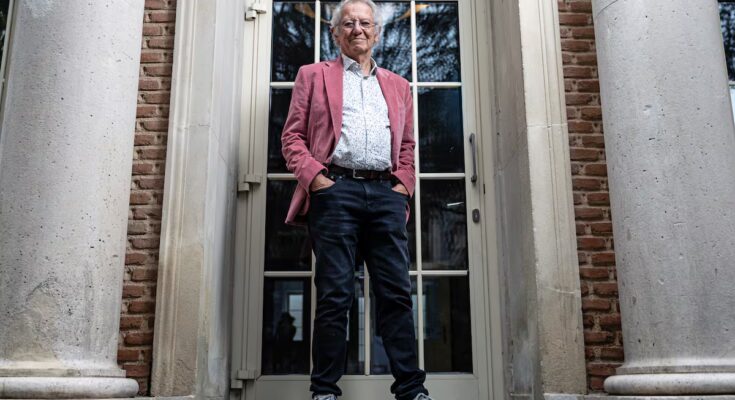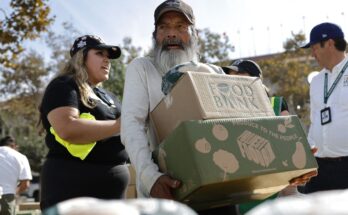What happens if a country unilaterally decides to implement a large-scale experiment to cool a part of the planet that could generate unwanted effects beyond its borders? Sir David King (South Africa, 86), a leading British chemist and expert in combating climate change, is not so much concerned about investigating extreme measures that he believes may be possible solutions to global warming, but is concerned that these are applied before countries agree on how they should be used. 10 years ago, as the United Kingdom’s climate negotiator, King was one of the promoters of the inclusion in the Paris Agreement of the 1.5 degree target, a safety limit that is beginning to be exceeded. He is now president of the Climate Crisis Advisory Group, and a few days ago he participated in a conference in Madrid on alternatives to climate change organized by the universities of Vigo and Pontificia Comillas, together with the CSIC.
Ask. Why do you argue that we need a new approach in the fight against global warming?
Answer. We need a new approach, yes. There are many reasons, but I’ll give you three facts. The first: in the last 10 years Greenland has lost 30 million tons of ice every hour. If all of Greenland melted, sea levels across the planet would be 7.5 meters higher. There’s a lot of ice there. Is it irreversible? Maybe yes, and maybe no. It’s not clear to us why it would stop melting. In any case, the future of humanity does not look very bright if sea levels were to rise by 7.5 meters. And that’s just in Greenland. If we go to the West Antarctic Ice Sheet, that’s where another six meters of sea level rise can be sent into the ocean. If you add all this, rising sea levels will change the map of the world. The second fact is that temperatures have already reached well above 1.5 degrees. In January this year, the global temperature was 1.75 degrees above the pre-industrial level. It may go down, so we can’t take a single figure, but the target of 1.5 has already been exceeded. Third fact, I just need to say Valencia and you can already see the enormous risk we run.
Q. What needs to be done to rebalance the planet’s climate?
R. Suppose that tomorrow we could achieve zero emissions in the world. Of course it’s impossible, but if we could, would Greenland’s ice stop melting? We think not. Greenland is already melting irreversibly with the current situation. We need more action now, there are four essential Rs for the future of humanity: reduce, retreat, repair and resilience. The first thing we need to do – and let me underline this – is to reduce emissions, quickly and forcefully. Today we emit more than 40,000 million tons of CO₂ into the atmosphere per year. And they continue to increase. If we don’t reduce emissions, frankly, we’re broke.. But we also need to eliminate greenhouse gases already in the atmosphere, we need to find new ways to capture and eliminate gases like CO₂ and methane. The third R is repair: Can we prevent the ice that forms on the Arctic sea in the winter from melting when the sun returns to the North Pole in the summer? There are several research groups around the world that are studying it. And the fourth R is resilience. Every city in the world needs to develop resilience. Every region of the world has to adapt to what will happen. Every mayor should worry about this.
Q. Why would it be good to prevent Arctic sea ice from melting in the summer?
R. In winter the ice that forms on the Arctic sea reflects the sun’s rays, but in summer that thin layer of ice disappears and the blue sea absorbs the heat.
Q. But some of these actions to “fix” the planet’s climate are extreme measures that have never been attempted.
R. The word “extreme” already carries some weight, but yes, to stop climate change we need extreme measures. It is true that they have not been tested, which worries me too, but a governance procedure is needed to manage all these technologies. Let’s take the example of India: hundreds of thousands of Indians can die in a summer due to heat stress. The current number is already high, but no data is published. Deaths could exceed one million people due to the heat. Will the Indian government stop its scientists from trying to solve this problem? This worries me: that a country or a private company does it alone. There are scientists studying how to cool the planet, no one should stop these experiments. But such investigations should not be launched until we have adequate global governance procedures.
Q. How will these investigations manage to cool the planet?
R. The technique I am most familiar with is marine cloud bleaching. A dark cloud, such as those that bring rain or snow, absorbs the sun’s heat, but a white cloud reflects sunlight back into space. The idea is to cover the Arctic Circle region with white clouds for three months of the year, using sea water. Small drops of sea water can be created, which then rise with the heat and lose their water, leaving salt crystals suspended at around 2,000 meters above sea level, making the clouds white. This is what we are trying to do. If something goes wrong and the clouds move where people don’t want them to be, we can stop producing them. But the idea isn’t cheap. It would require 2,000 ships across the North Pole region and that would cost many billions of dollars.
Q. Don’t you think it’s dangerous to apply climate engineering without knowing all its effects?
R. What is happening now is very dangerous. Look at the hurricane Melissa: When it hit Jamaica, it was traveling at 200 kilometers per hour. Where have we seen such a ferocious hurricane before?
Q. And aren’t these extreme measures, of which we don’t know if they work, a distraction from reducing fossil fuel consumption?
R. The priority must be to stop using fossil fuels. Today, investments in renewable energy systems around the world are in the hundreds of billions of dollars, the money I’m talking about is in the hundreds of millions, a small price to pay to create a possibly manageable future for humanity. And I say “maybe” because you’re right, we don’t know if it will work, but we’re trying.
Q. Do you think it is really possible for countries to agree on how to manage these techniques to artificially alter the climate?
R. It is very important that they do this, but at this point we cannot expect all countries in the world to agree. I would say the same for all climate action. Neither Russia nor the US will take serious action on climate change, but the rest of the world will have to act on the four R’s. If we reach an agreement between China, India, Brazil (hosting the climate summit), the EU and the UK (we are no longer in the EU, and that makes me sad), then we can expect the US and Russia to join later. I refuse to believe that rejecting the US and Russia is the end game, it can’t be, I have little grandchildren. And the priority must be to stop using fossil fuels if we are not done.
Q. Bill Gates has said that climate change will not wipe out humanity and has called for another approach that does not focus so much on reducing emissions. What do you think?
R. You are quoting someone who is not a scientist, I am a scientist.



